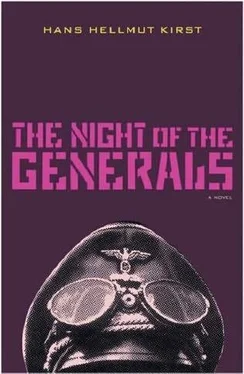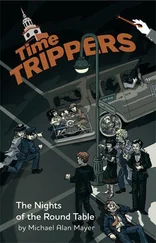“I do indeed,” he replied tersely.
These were the first words that General Tanz had uttered since his arrival. He had endured the preliminaries in silence and had wordlessly offered Ulrike von Seydlitz-Gabler his arm when they went in to lunch. He had not seemed particularly interested in his table-companions’ conversation and devoted all his attention to the business of eating. He drank water instead of wine, but no one was surprised at that. The General was known to be a man of iron self-discipline.
Frau Wilhelmine regarded him with a frank blend of tenderness and admiration. “Ah yes, we all have to make sacrifices, don’t we?”
“And what sacrifices do you make, General?” asked Ulrike casually.
“I am a soldier,” said General Tanz, who evidently considered this a sufficient answer.
“My dear child,” said von Seydlitz-Gabler, gently reproving, “it’s about time you realized that you were born into a world of self-denial. I’m a soldier too, and so were my ancestors before me.”
“I happen to be a woman,” said Ulrike.
“I’m aware of that. ” The G.O.C. smiled like a perfect host watching one of his guests smashing a priceless heirloom. “But the female members of our family have always married soldiers.”
“And never regretted it!” put in Frau Wilhelmine.
“Some soldiers lie and rot on the battlefield, so I’m told,” Ulrike said defiantly. “They aren’t all lucky enough to rot in comfortable staff jobs.”
“You’re mistaken, Fräulein,” said General Tanz in measured tones. “For instance, the members of my staff are given every opportunity to train the healthy body on which the healthy mind depends. In my command, even staff officers take part in early morning sports, cross-country runs and field training. Nobody rots with me.”
“Nor with us,” remarked Kahlenberge. “We practise club-swinging with bottles and dig trenches with knives and forks. Our conferences are marathon efforts. Anyone who wants to survive with us has to be an all-round athlete.”
Frau Wilhelmine von Seydlitz-Gabler endeavoured to inject a more friendly note into the proceedings. “General Tanz,” she said, “to my mind, you’re a model man in every respect save one: you’re not married. May I ask why not?”
“No opportunity,” replied the General. “Greatly regret it.”
“Perhaps you’ve had plenty of opportunities and just let them slip?”
“Maybe,” said General Tanz, with the look of a man surveying a battlefield. “We cannot choose the age we live in, but it’s our duty to shape it. That leaves us precious little time for what is commonly known as private life. We live in a period which makes great demands on us.”
“One of them being the extermination of the Jews, I suppose?” asked Ulrike aggressively.
“Child, child!” Frau Wilhelmine raised her right hand in protest. “What a subject—and lunch not over yet!”
“Life is a struggle,” said General Tanz, dissecting his cheese. “Anyone who proposes to build a world order must be capable of destroying anything that threatens it.”
“Human beings are capable of the most incredible things,” commented Kahlenberge bitterly.
“I merely try to do my duty,” said General Tanz.
“Only your duty, nothing more?” Kahlenberge leant back in his chair as though evading an unseen blow. “To do nothing but one’s duty can be a demoralizing process.”
Frau Wilhelmine said firmly: “General Tanz is a man!”
“We’re all men,” declared the G.O.C. He raised his champagne glass as though it was a field-marshal’s baton. “We are fighting a war that was forced on us, but we wage it unflinchingly.”
Coffee, brewed in the Turkish fashion, was served in the Blue Room. The carpet that covered the floor was a mixture of deep blue and subdued marine tones, heavy midnight blue hangings swathed the walls, and the pale crocus blue of the moulded ceiling shimmered like a clear sky in early spring.
Into this extravagant symphony in blue stepped Major Grau. His lean, slightly saturnine face wore an ingratiating smile. “I have what I hope will be an entertaining item of news for you,” he said when introductions were complete. “That is, if you’re interested. It concerns a highly unusual corpse—a female corpse, to be precise.”
“I think,” Wilhelmine von Seydlitz-Gabler said stiffly to her daughter, “that it would be better if we left the men alone.”
Ulrike followed her mother out of the room. An uneasy silence reigned for a moment after the door had shut.
“Our good ladies,” declared the G.O.C., “have a marked sense of tact where official matters are concerned.”
Kahlenberge glanced keenly at Grau. “Is this official?”
“It’s not beyond the bounds of possibility,” said Grau.
“Are you still talking about a woman’s corpse?”
“Why not? Does anyone mind?”
General von Seydlitz-Gabler threw back his head and laughed. It was a melodious sound, the product of years of practice, and he was well aware of its effect. “What is all this about a corpse, my dear chap? Surely you can find a more entertaining subject. Perhaps you’d do better to concentrate on the Hartmann case.”
“The Hartmann case doesn’t concern me, sir,” said Major Grau. “Officially, it’s the S. D.’s pigeon. Besides, the whole business seems to be little more than a comedy of errors. The man was declared dead. Let the matter take its course, I say.”
“Are those patent leather shoes you’re wearing?” asked General Tanz abruptly.
Major Grau raised his decorative head. “Are they forbidden?”
“I find them ludicrous,” said General Tanz.
“I don’t belong to your division.”
“Unfortunately.”
Kahlenberge shook his glistening skull as if trying to dislodge a fly. “What are we talking about, anyway, that poor devil Hartmann—or are we back on the subject of dead females?”
“Are you wearing perfume, by any chance?” General Tanz asked with a face like granite.
Major Grau retained his expression of unruffled serenity. “I occasionally use a strong after-shave lotion.”
General von Seydlitz-Gabler kneaded his fingers until the joints cracked, but his rubicund features lost none of their disarming benevolence. He emitted a series of conciliatory sounds.
The G.O.C. was a man who liked harmony to reign in his immediate circle. In an endeavour to change the subject he recalled an amusing incident from the days when he was a young officer in the first world war. It concerned some British prisoners and a bet which he, then adjutant of his regiment, had made with his commanding officer. Under the terms of the wager he, von Seydlitz-Gabler, had to induce his prisoners to sing the German national anthem within the space of three days. They ended by singing not only the Deutschland-Lied but alsoIch bin ein Preusse, kennt ihr meine Farben? (he assured them on his word of honour) in four parts!
This truly hilarious anecdote was greeted with general laughter, although it was a standard item in the General’s repertoire and everyone in the room knew it of old. Even Grau seemed amused. There was an improvement in the atmosphere, further enhanced by the appearance of a mess waiter with a bottle of Napoleon Brandy, guaranteed thirty years old. Even Tanz accepted a glass.
Major Grau exploited the appreciative silence that followed by interjecting: “I do hope you’ll permit me to return to the corpse I mentioned earlier. I’m sure you’ll agree it’s a unique case.”
Kahlenberge shook his head indulgently. “You must be joking, my dear Grau. We live in an age in which bodies lie around in the streets like cobble-stones. What’s so unique about this one.”
Читать дальше












